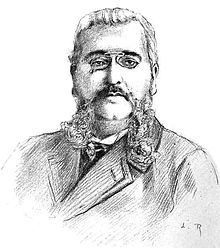Francis de Pressensé

Francis Charles Dehault de Pressensé (September 30, 1853, Paris – January 19, 1914, Paris) was a French politician and journalist.
Biography[edit]
He was the son of Protestant religious leader Edmond de Pressensé. He was educated at the Lyceé Bonaparte. He served on General Chanzy’s staff during the war of 1870 and was taken prisoner at Le Mans, but after the war entered the public service. After a short period at the Ministry of Public Instruction, he entered the diplomatic service, and was appointed first secretary at Washington, D.C. In 1882 he returned to France and took up journalism. He was a contributor to many journals, including the Revue des Deux Mondes and the République Française, and in 1888 became foreign editor of the Temps.
On the rise of the Dreyfus Affair (1895) de Pressensé identified himself with the cause of the prisoner. He wrote in support of General Picquart, and in consequence of his advocacy of Émile Zola's cause was struck off the roll of the Legion of Honour. This led to his resignation from the Temps, and he came forward as a socialist politician, being in 1902 elected socialist deputy for the Rhône. He was prominent in the debates on the question of the separation of church and state, and a bill brought in by him formed the basis of the one finally carried by Aristide Briand.
Honors[edit]
A street in Sofia, Bulgaria is named after him. A street in Lille, France, is named after him. A square in Bordeaux, France is named after him.
Notes[edit]
This article includes a list of references, related reading, or external links, but its sources remain unclear because it lacks inline citations. (February 2014) |
References[edit]
 This article incorporates text from a publication now in the public domain: Chisholm, Hugh, ed. (1922). "Pressensé, Francis de". Encyclopædia Britannica (12th ed.). London & New York: The Encyclopædia Britannica Company.
This article incorporates text from a publication now in the public domain: Chisholm, Hugh, ed. (1922). "Pressensé, Francis de". Encyclopædia Britannica (12th ed.). London & New York: The Encyclopædia Britannica Company.
External links[edit]
- 1853 births
- 1914 deaths
- Writers from Paris
- French Protestants
- French Section of the Workers' International politicians
- Members of the 8th Chamber of Deputies of the French Third Republic
- Members of the 9th Chamber of Deputies of the French Third Republic
- Members of Parliament for Rhône
- French journalists
- French male non-fiction writers
- Human Rights League (France) members
- French military personnel of the Franco-Prussian War
- Dreyfusards
- Recipients of the Legion of Honour
